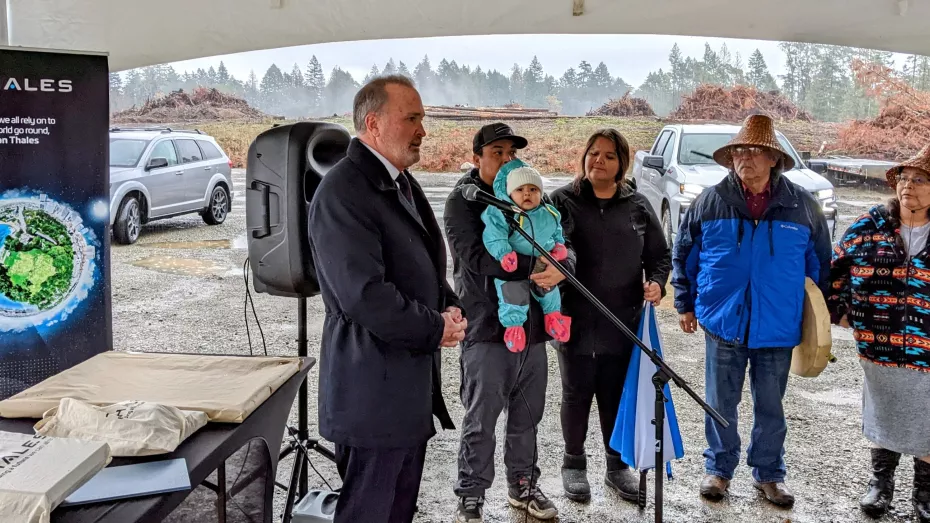Our Commitment to Reconciliation
Thales is committed to reconciliation with Indigenous peoples and communities across Canada. We believe that reconciliation is everyone’s responsibility, and we take our role in that to heart.
In support of Call to Action 92, we commit to meaningful consultation and to fostering respectful and enduring relationships built on a foundation of engagement and trust.
We will actively pursue opportunities to collaborate on long-term sustainable economic development projects that benefit Indigenous communities while helping better serve our customers in Canada and around the world.
We will also conscientiously strive to ensure that Indigenous peoples have equitable access to jobs and other opportunities to contribute to the fulfilment of our business and societal goals.
“Reconciliation is integral to Thales’ purpose of building a future we can all trust. In fact, trust demands that all of us in Canada carry out the work of reconciliation with Indigenous peoples. Thales Canada’s commitment stems from a deeply held belief that collaboration with Indigenous businesses and communities is both good and necessary business – for everyone. We embark on this journey with a learning mindset, with equal parts humility and resolve, and in the spirit of creating a safer, greener and more inclusive world for generations to come.”
— Chris Pogue, Thales Canada CEO
Our Reconciliation Commitment Pillars
The following pillars frame Thales Canada’s commitment to reconciliation, each essential to achieving Thales Canada’s goals of meaningful consultation and fostering respectful and enduring relationships with Canada’s Indigenous communities.
Community Engagement. Partnership with Indigenous Industry. A Roadmap to Meaningful Relations.
Community Engagement
Thales’ first significant steps toward reconciliation and engagement with Indigenous communities took place in 2022 at a land blessing ceremony on the Malahat Nation.
It represented a communal opportunity to give thanks to the land on the future site of Thales Canada’s west coast centre of operations. The new facility will primarily be used to support the Royal Canadian Navy’s AJISS Program: the comprehensive, long-term, in-service support contract for the Arctic Offshore Patrol Vessels (AOPV) and the Joint Support Ships (JSS), for which Thales is the prime contractor.
“This land, which has provided for the Malahat Nation for centuries, will continue to contribute to a sustainable local economy. It’s a privilege to work with Yos Economic Development, and the Nation’s Chief and Council, to develop this facility – designed with the environment in mind. We look forward to deepening our relationship and to expanding our relationship to explore opportunities beyond AJISS.”
— Greg Lewis, AJISS Esquimalt Manager

Partnership with Indigenous Industry
Thales is actively exploring other partnership opportunities with Indigenous businesses in Canada.
In the context of the new National Digital Excellence Centre in Fredericton, New Brunswick, Thales is engaging the Joint Economic Development Initiative with a view to leveraging opportunities for Indigenous participation and cooperation.
“We’re actively seeking out Indigenous partners for the long term, to build meaningful and sustainable business relationships. The MWAV contract, for example, which could be in place for up to 19 years, is expected to contribute $1.2 million annually through direct and indirect contributions to Indigenous businesses and communities in Canada and we look forward to working with Indigenous businesses from coast to coast on this program.”
— Tom Rose, Offsets Director
A Roadmap to Meaningful Relations
While Thales Canada started to develop meaningful Indigenous relations with the Malahat Nation in 2021, we recognized that there would be value in adopting a structured approach to engagement.
Thales Canada chose to become a non-Indigenous member of the Canadian Council for Aboriginal Business and has committed to pursuing their Progressive Aboriginal Relations ™ certification, ensuring that our path forward is lined with signposts to both guide and gauge our progress along the way.
Having established a cross-business and cross-functional working group, work has begun to identify, organize and drive action as it relates to leadership, employment, business development and community engagement.
“We recently committed to a multi-year journey toward certification in Progressive Aboriginal Relations. Along the way, we will be deliberately authentic and thoughtful in our engagement, challenging ourselves to listen and learn together. We look forward to engaging in thriving relationships, and working together with the CCAB, and Indigenous businesses and communities to create shared value based on mutual respect and collaboration.”
— Cara Salci, Vice-President, Strategy and Government Relations